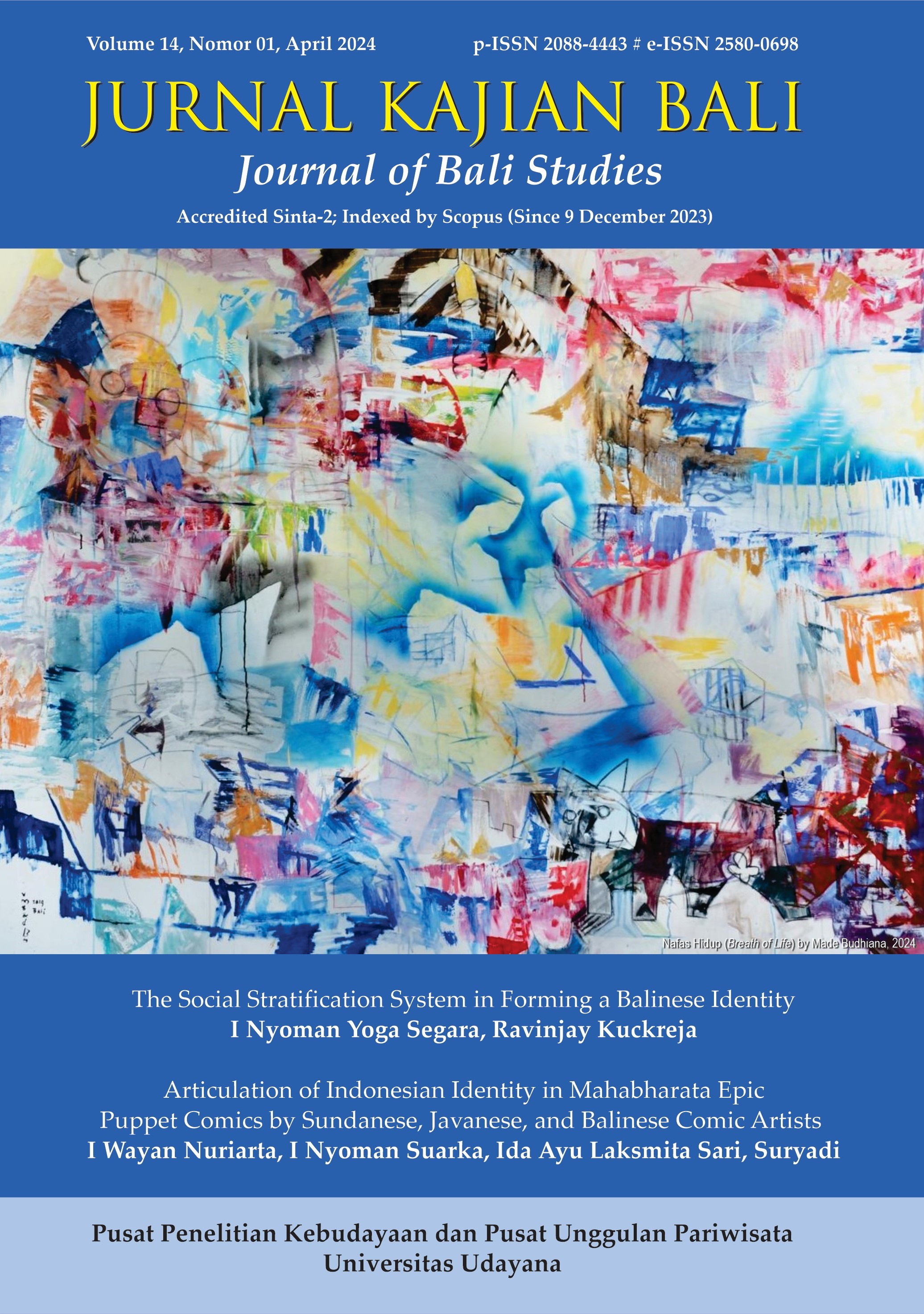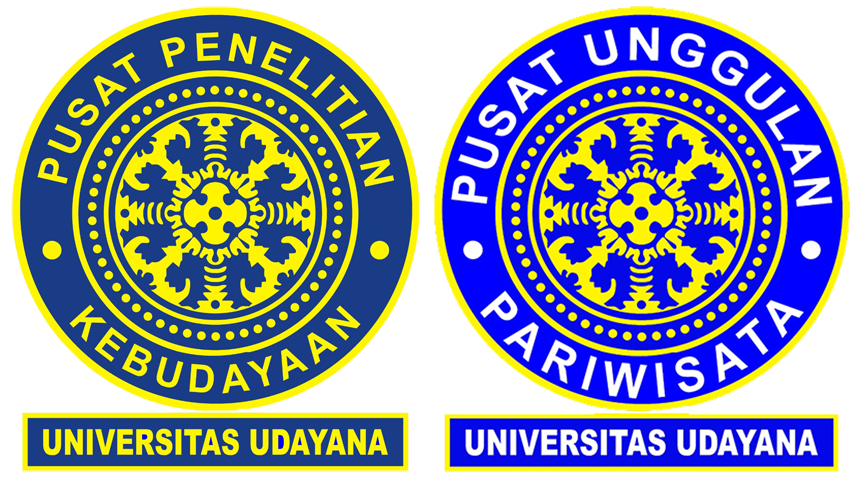The New Social Movement of Nirkala Bali Community: The Struggle of the Individuals with Sensory Visual Disability Against the Stereotype as Masseuses in Bali
Abstract
This article investigates the movement of sensory visual disability individuals in Denpasar, Bali. The Nirkala Bali Community took the initiative to challenge prevailing stereotypes that link people with sensory visual impairments solely to occupations such as massage therapists and special education teachers. Instead, they underwent a significant transformation and actively participated in the arts sector. This paper aims to determine the success or lack thereof of their movement and to identify any growing support or awareness for it. This study employed a phenomenological approach and recruited participants from the entire Nirkala Bali Community. In-depth interviews and observations of artistic works uploaded to YouTube comprised the data collection process. This article serves as an introduction to the activism of the Nirkala Bali Community, which is representative of the sensory visual disability movement in Bali. This study is expected as the introduction that will facilitate comprehension of their endeavors to combat the pervasive stigmatization that pervades society.
Downloads
References
Baxter, J., et al. (2017). Coping with Uncertainty: Gender and Leadership Identities in UK Corporate Life. In Dorien Van De Mierrop & Stephanie Schnurr (Eds)., Identity Struggles: Evidence from Workplaces Around the World (pp.21-38). DOI: https://doi.org/10.1075/dapsac.69.02bax
Diah Astriningsih, N., Suarka, I., & Mudana, I. (2019). Menari Tanpa Rasa: Pendidikan Kritis Anak Tunagrahita dalam Pembelajaran Seni Tari di SDLB Kuncup Bunga Denpasar. Jurnal Kajian Bali (Journal Of Bali Studies), 9(1), 209-226. https://doi.org/10.24843/JKB.2019.v09.i01.p10
Fashri, F. (2014). Pierre Bourdieu: Menyikap Kuasa Simbol. Yogyakarta: Jalasutra.
Fukuyama, F. (2018). Identity: The Demand for Dignity and the Politics of Resentment. London: Profile Books Ltd.
Herman, M. (2009). Identity Struggles: Evidence from Workplaces around the World. Amsterdam: John Publishing Company.
Ife, J & Tesoriero, F. (2008). Community Development: Alternatif Pengembangan Masyarakat di Era Globalisasi. Yogyakarta: Pustaka Pelajar.
Jihad, I. F. (2020). Wacana Identitas Disabilitas dalam Film What They Don’t Talk When They Talk about Love (2013). Dissertation - Universitas Airlangga.
Kartika, R. (2018). Pola Pengasuhan Anak Pada Orang Tua Tuna Netra (Studi Kasus Klinik Pijat Tuna Netra Barokah). Jurnal Pendidikan Ilmu Sosial, 27(2), 156-169. https://doi.org/10.17509/jpis.v27i2.14095
Maarif, A.S.., et.al. (2010). Politik Identitas dan Masa Depan Pluralisme Kita. Jakarta: PUSAD Yayasan Wakaf Paramadina.
Marsitadewi, K. E., & Widnyani, I. A. P. S. (2021). Peran Pemerintah Kota Denpasar Dalam Mengakomodasi Hak Penyandang Disabilitas dalam Memperoleh Pekerjaan. POLITICOS: Jurnal Politik dan Pemerintahan, 1(2), 98-112. https://doi.org/10.22225/politicos.1.2.2021.98-112
Morissan. (2019). Riset Kualitatif. Jakarta: Prenadamedia Group.
Muharom, A. N. (2019). Implementasi Hak Dan Kewajiban Keluarga Pada Pasangan Tunanetra di Kecamatan Kebonsari Kabupaten Madiun. Dissertation - Institut Agama Islam Negeri Ponorogo.
Nastiti, A.D. (2017). Identitas Kelompok Disabilitas dalam Media Komunikasi Online: Studi Mengenai Pembentukan Pesan Identitas Disabilitas dalam Kartunet.com. Jurnal Komunikasi Indonesia, 2(1), 31-42. https://doi.org/10.7454/jki.v2i1.7828
Nofrima, S., and Qodir, Z. (2021). Gerakan Sosial Baru Indonesia: Studi Gerakan Gejayan Memanggil 2019. Jurnal Sosiologi Reflektif, 16(1), 185-210. https://doi.org/10.14421/jsr.v16i1.2163
Rezeki, F, dkk. (2020). Manajemen Sumber Daya Manusia dalam Organisasi. Bandung: Media Sains Indonesia.
Rusmanto, J. (2013). Gerakan Sosial: Sejarah Perkembangan Teori, Antara Kekuatan dan Kelemahannya. Sidoarjo: Zifatama Publishing.
Sari, A. R. (2017). Pemanfaatan Modal Sosial Tunanetra sebagai Tukang Pijat dalam Meningkatkan Status Sosial Ekonomi Keluarga (Studi Kasus 5 Keluarga Suami Istri Tuna Netra yang Bekerja sebagai Tukang Pijat). Undergraduate Thesis - Universitas Sumatera Utara.
Singh. (2010). Gerakan Sosial Baru. Yogyakarta: Resist Book.
Soyomukti, N. (2014). Pengantar Sosiologi: Dasar Analisis, Teori, & Pendekatan Menuju Analisis Masalah-Masalah Sosial, Perubahan Sosial, & Kajian Strategis. Yogyakarta: Ar-Ruzz Media.
Stryker, S., and Burke, P. J. (2000). The Past, Present, and Future of an Identity Theory. Social Psychology Quarterly 63 (4) :284–297. https://doi.org/10.2307/2695840
Sukmana, O. (2016). Konsep dan Teori Gerakan Sosial. Malang: Intrans Publishing.
Sztompka, P. (2017). Sosiologi Perubahan Sosial. Jakarta: Kencana.
Tangkas, M., & Suari, A. (2023). Pemertahanan Bahasa Bali Dialek Nusa Penida sebagai Sumber Konten Kreatif: Kajian Sosiolinguistik Kanal YouTube Alit Werdi Suputra. Jurnal Kajian Bali (Journal Of Bali Studies), 13(2), 541-566. https://doi.org/10.24843/JKB.2023.v13.i02.p08
Wahyudi. (2021). Penggunaan Media Sosial sebagai Sarana Gerakan Sosial. Yogyakarta: Bildung.
Wibowo, S. H. (2014). Strategi Bertahan Hidup Penyandang Tunanetra Pedagang Kerupuk Keliling (Studi Kasus Di Kecamatan Pamulang Kota Tangerang Selatan). Undergraduate Thesis - Universitas Islam Negeri Syarif Hidayatullah.
Yunus, S., et.al. (2017). Model Pemberdayaan Masyarakat Terpadu. Aceh: Bandar Publishing.

This work is licensed under a Creative Commons Attribution 4.0 International License.



















